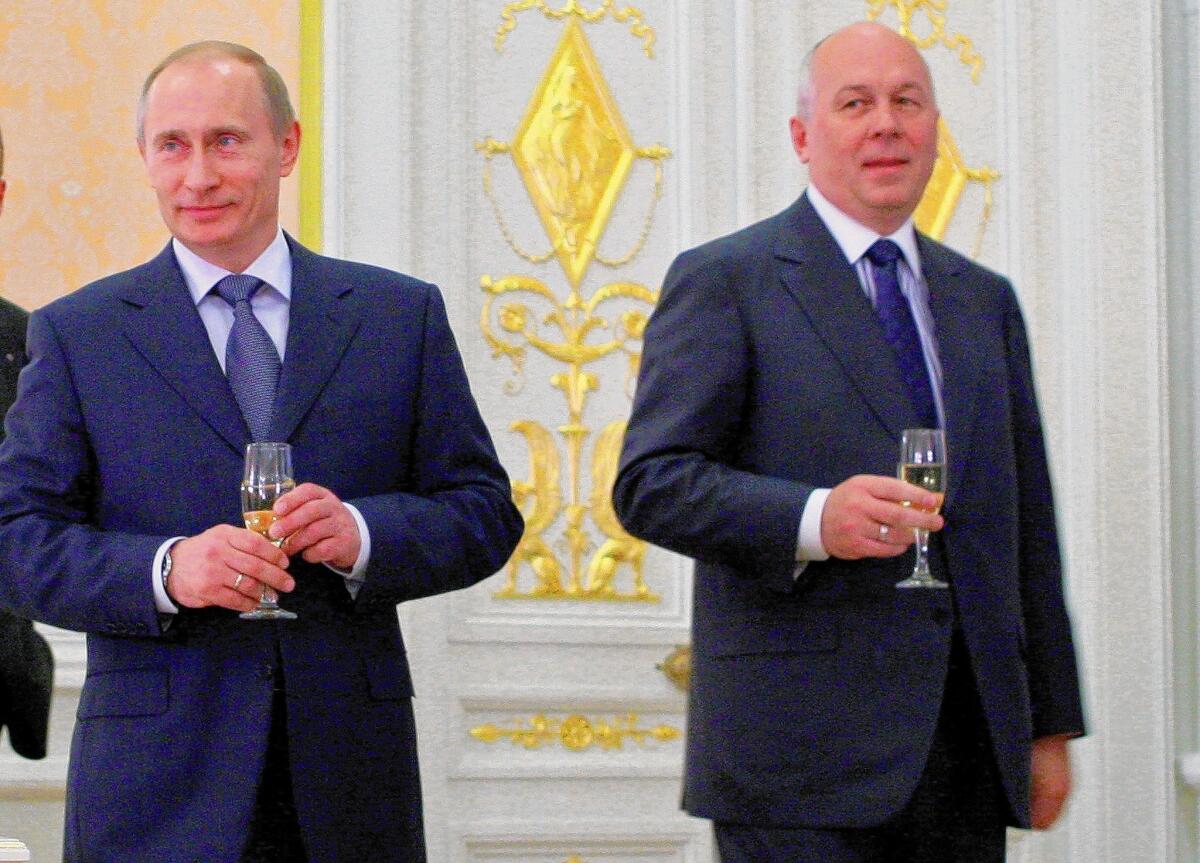U.S. slaps new sanctions on Russian business, government leaders

- Share via
Reporting from Washington — Trying to drive a wedge between Vladimir Putin and the oligarchs who support him, the Obama administration slapped sanctions Monday on another two dozen Russian financiers, government officials and companies in an effort to pressure the Russian president to back down in Ukraine.
The new blacklist, the fourth since Russia took control of Ukraine’s Crimean peninsula in March, stops short of trying to choke off major industries or vulnerable sectors of the Russian economy, including oil and gas exports, or financial institutions. No large banks or state-owned businesses are on the list.
“These sanctions represent the next stage in a calibrated effort to change Russia’s behavior,” President Obama said during a news conference in Manila, where he is wrapping up a weeklong tour of Asia. “We don’t yet know whether it’s going to work.... But we are keeping in reserve additional steps that we could take should the situation escalate further.”
Obama repeated warnings that broader economic sanctions would follow if Russia engaged in “further … aggression.” An estimated 40,000 Russian troops are massed on Ukraine’s eastern border, holding what Russian officials say are military exercises.
The new U.S. list targets seven Russians, including two members of Putin’s inner circle, for travel bans and asset freezes. It also includes 17 companies, including oil and infrastructure firms, with close ties to Putin, according to the White House.
The Commerce Department said it would deny or revoke export licenses held by several Russian companies that export high-tech defense equipment.
The European Union agreed to roll out related sanctions Tuesday, but will move more cautiously than Washington. The EU, which is much more closely tied than the U.S. to Russia’s energy and industrial sectors, is expected to name 15 Russians and pro-Russia Ukrainian leaders, but not go after any companies.
The U.S. and Europe now have imposed sanctions on close to 100 Russians and Ukrainians, including several billionaires and business executives close to Putin, as well as several banks and companies.
Critics lambasted the list as insufficient to deter Putin. Some Republicans argued that the administration should go after more prominent Russian banks and companies, such as the energy giant Gazprom.
Sen. Kelly Ayotte (R-N.H.) described the sanctions as “tepid, incremental.”
Cliff Kupchan, an analyst with the Eurasia Group risk-consulting firm, said the 17 companies targeted are not large enough to create much impact. “This won’t hurt the Russian economy,” he said.
U.S. and European officials have not agreed on how far to go, or how quickly. Some diplomats say that overly harsh sanctions could backfire, hurting European economies in particular, without changing Putin’s course.
The White House had planned to roll out the latest sanctions after a fiery condemnation of Russia by Secretary of State John F. Kerry on Thursday evening. But they held back to give Europe more time.
A senior U.S. official said the detention Friday of seven military observers from the Organization for Security and Cooperation in Europe, along with their German interpreter, strengthened Europe’s willingness to penalize Moscow. Pro-Russia separatists have accused the Westerners of being NATO spies, and have freed only one, the observer from Sweden, which does not belong to the alliance.
White House officials say Russia’s intervention in Ukraine already has cost its economy billions of dollars, and that sanctions are rattling Putin’s “cronies.” They cited a depreciation of the Russian currency, the ruble; increasing capital flight; and rising borrowing costs for a government that is heavily dependent on foreign capital.
Officials have not said whether they will target Putin’s personal wealth, which is believed to be sizable but is difficult to track. Obama denied that was his aim.
“The goal here is not to go after Mr. Putin personally,” he said in Manila. “The goal is to change his calculus. And to encourage him to actually walk the walk and not just talk the talk when it comes to diplomatically resolving the crisis in Ukraine.”
Among those targeted was Igor Sechin, a former Russian deputy prime minister and now the president of Rosneft, a petroleum company that was not sanctioned.
Sergei Chemezov, head of a state-owned technology and defense firm known as Rostec, was also blacklisted, although Rostec was not. U.S. officials described Chemezov as a long-trusted Putin ally who has known the Russian leader since they lived in the same apartment complex in East Germany in the 1980s.
The blacklist includes two Russian banks, InvestCapitalBank and SMP Bank, both controlled by Arkady and Boris Rotenberg, who were sanctioned last month. The billionaire brothers are childhood friends of Putin.
Most of the remaining entities are interests associated with Gennady Timchenko, founder of a commodities trading firm. Timchenko was already sanctioned for assisting an unnamed “senior official of the government of the Russian Federation.” Timchenko controls several rail, aviation, construction and other infrastructure companies.
kathleen.hennessey@latimes.com
Times staff writer Christi Parsons in Manila contributed to this report.
More to Read
Sign up for Essential California
The most important California stories and recommendations in your inbox every morning.
You may occasionally receive promotional content from the Los Angeles Times.















